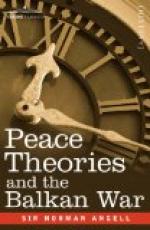We are all agreed as to the fundamental cause of the Balkan trouble: the hate born of religious, racial, national, and language differences; the attempt of an alien conqueror to live parasitically upon the conquered, and the desire of conqueror and conquered alike to satisfy in massacre and bloodshed the rancour of fanaticism and hatred.
Well, in these islands, not so very long ago, those things were causes of bloodshed; indeed, they were a common feature of European life. But if they are inevitable in human relationship, how comes it that Adana is no longer duplicated by St. Bartholomew; the Bulgarian bands by the vendetta of the Highlander and the Lowlander; the struggle of the Slav and Turk, Serb and Bulgar, by that of Scots and English, and English and Welsh? The fanaticism of the Moslem to-day is no intenser than that of Catholic and heretic in Rome, Madrid, Paris, and Geneva at a time which is only separated from us by the lives of three or four elderly men. The heretic or infidel was then in Europe also a thing unclean and horrifying, exciting in the mind of the orthodox a sincere and honest hatred and a (very largely satisfied) desire to kill. The Catholic of the 16th century was apt to tell you that he could not sit at table with a heretic because the latter carried with him a distinctive and overpoweringly repulsive odour. If you would measure the distance Europe has travelled, think what this means: all the nations of Christendom united in a war lasting 200 years for the capture of the Holy Sepulchre; and yet, when in our day the representatives, seated round a table, could have had it for the asking, they did not deem it worth the asking, so little of the ancient passion was there left. The very nature of man seemed to be transformed. For, wonderful though it be that orthodox should cease killing heretic, infinitely more wonderful still is it that he should cease wanting to kill him.
And just as most of us are certain that the underlying causes of this conflict are “inevitable” and “inherent in unchanging human nature,” so are we certain that so unhuman a thing as economics can have no bearing on it.
Well, I will suggest that the transformation of the heretic-hating and heretic-killing European is due mainly to economic forces; that it is because the drift of those forces has in such large part left the Balkans, where until yesterday the people lived the life not much different from that which they lived in the time of Abraham, to one side that war is now raging; that economic factors of a more immediate kind form a large part of the provoking cause of that war; and that a better understanding mainly of certain economic facts of their international relationship on the part of the great nations of Europe is essential before much progress towards solution can be made.
But then, by “economics,” of course, I mean not a merchant’s profit or a moneylender’s interest, but the method by which men earn their bread, which must also mean the kind of life they lead.




